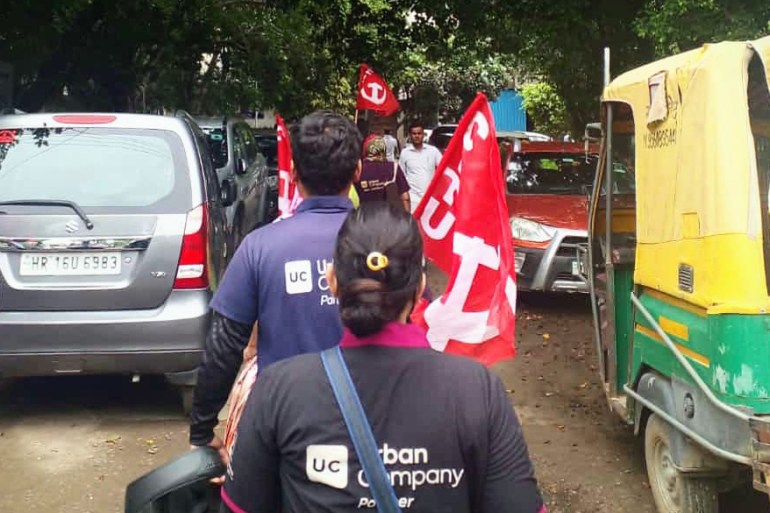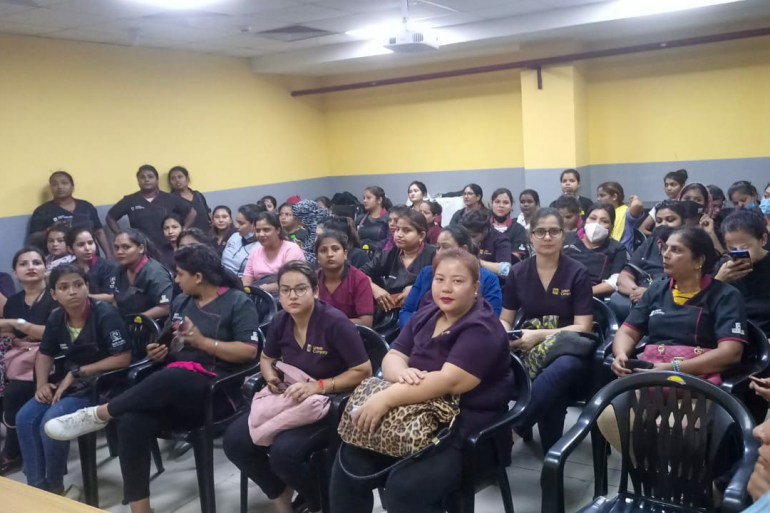Bengaluru, India — After years of working at a salon in Bengaluru, Shakeela Banu made a major life change in 2018 and joined Urban Company (UC), an app-based home services platform that has more than 52,000 workers across Indian cities, one-third of whom are women.
At first, Banu was happy with the working conditions. Her manager treated her well, she said, and she got plenty of work as a beautician on call. She estimates that she’s worked with 3,000 customers since she joined the company and has turned down many requests from those who would ask for her services privately. It was her way of staying loyal to her employers.
However, things have soured since then.
Last year, the platform rolled out new rules including that workers maintain ratings of 4.7 or higher out of 5 and accept 70 percent of the job leads, with only four cancellations allowed in a month to avoid getting blocked.
Banu was one of many UC workers whose profile was blocked due to “low” ratings.
On its blog, the company said that these measures are meant to raise the operating standards for workers and improve customer experience. (There are also plans afoot for stricter rules under which workers will need to accept at least 80 percent of the jobs and only three cancellations will be allowed.)
If workers miss these criteria, they receive a warning and need to attend either online or offline sessions to retrain in services where they have received poor ratings. If their metrics don’t improve after that, their profiles are blocked. Retraining online is free, but the workers have to pay a fee, ranging between 6,000 rupees and 15,000 rupees (between about $72 and $180), if they have to train at the UC office.
Urban Company relies on a pay-to-work model which asserts that workers are “independent partners” who are being provided with a customer base and professional training they would not otherwise have.
The workers incur multiple costs before they qualify for jobs with UC, including training fees, onboarding fees, product fees, and a monthly subscription fee to get a guaranteed quota of jobs, averaging about 50,000 rupees (about $600). Additionally, for every job, UC also takes a commission fee of up to 25 percent in service charges and taxes. Workers are not compensated for travel costs or vehicle rents.
Urban Company did not respond to Al Jazeera’s request for comments.
Bad reviews, blockings
When UC launched in 2014, workers were attracted to the flexible schedule it offered. In Ghaziabad, Maya Pal, who used to run her own salon, joined UC to get some extra work in 2018.

“Before, we used to get 60 to 70 jobs every month. Now we get job leads once every two days if we are lucky,” said Pal, who has been working with UC for four years. “Then they ask us to maintain our acceptance rates. If you don’t give us jobs, how do we maintain the rate?”
Even after being available on the app for 12 hours, the leads aren’t enough, workers say.
“On the app, we have to keep our location turned on. If we move away from our marked location, they stop sending job leads,” said Pal, adding the system requires her to be housebound all day.
During the lockdown, Pal had to close her salon. Then she met with a couple of accidents and had to cancel UC jobs. Her ID was blocked for four months. With no other income to support her family, Pal, a single mother of two, pulled her kids out of school.
She says that only when UC workers consistently receive five-star reviews on 10 jobs do their ratings improve. It takes one bad review to make it fall again.
UC partnered with the Ministry of Finance’s National Skill Development Corporation (NSDC) to provide training and digital certification to skilled professionals to help them become micro-entrepreneurs. At the same time, workers have been warned against sharing their phone numbers with their clients and all orders have to be via the UC app. Violations can lead to termination or blocking.
“There are seasonal blockings, too,” said Spandan Pratyush, secretary for the All India Gig Workers’ Union (AIGWU)-NCR, a trade union of all app-based workers in India. “You wouldn’t have seen a lot of blocking … when there was a huge demand around the period of [the Hindu festival] Diwali.” But since then, the blockings increased, workers said.
The workers think that the ongoing mass blockings since May 2023 are a step to extract money from new inductees while pruning older workers.
“The new workers won’t question the new policies, new rates and whatever conditions have been applied. But older workers who have been working for years under certain conditions, they would obviously object to changes way more,” Pratyush said.
All is not going well for the new trainees, either. In Gurugram on the outskirts of capital New Delhi, Deepali Khare interviewed with UC and joined as a trainee beautician in late August.
The beautician training at UC costs around 45,000 rupees (about $540), which includes the training fee and money to buy products used during training sessions. Khare agreed to pay this amount in instalments.
The training sessions, which started about 9:30am, were supposed to end by 6pm but would go till 9pm. Trainees also had to bring models to practise salon services on and pay for their food and transport.
The company did not mention “that we need to get 45 models for 45 days of training”, Khare told Al Jazeera.
Then, abruptly, in September, Khare received a message from her trainer that she need not attend more sessions. She was baffled. She had been dropped from training midway without any sort of performance review. Upon repeatedly asking why she’d been dropped, the company said that there were quality issues.
“If there are quality issues, why couldn’t they give us more training? During the interview, they had said that they would increase the training days if you are new to the job. There was no mention of failing us,” she says. “If they had, I would not have spent so much money on this. Isn’t this a type of fraud?”
Five others from her group of 10 had been removed, too.
“I still have the [product] kit I purchased from them. I must have paid about 14,000 rupees [$168] for it,” she said.

The trainees and workers are required to buy the products – a combination of known and in-house brands, used for services in the beauty, repairs and home-cleaning segment – directly from UC. Workers need to scan the barcodes of the products before every job and maintain a usage rate above 70 percent. These products, the workers say, are sold to them at inflated prices.
UC has also increased product prices. For instance, the price of the disposable kits used for the massage services, containing 25 packets of single-use items like bedsheets, pillow covers, towels, candles and napkins, was hiked from 1,440 rupees (about $17) in October to 1,800 rupees (about $22) in November. Massage oils that used to cost roughly 54 rupees now cost 66 rupees.
“It’s fine that they increase the price of the products. But then, shouldn’t they increase the price of the services, too? Only then will we be able to cover the costs,” said one worker who didn’t want to be named.
In its annual business summary for the financial year 2023 (FY23), UC reported that its losses before taxation fell from 5.14 billion rupees (about $62m) in FY22 to 3.08 billion rupees (about $37m) in FY23. Product sales contributed 22.13 percent of the FY23 revenue, where the collection increased from 910 million rupees (about $11m), or 20.77 percent, in FY22 to 1.41 billion rupees (about $17m) in FY23.
The rest of the revenue comes from service sales including the commission UC charges its workers, which, along with product sales and fees, can total up to nearly 40 percent.
Protests
After a spate of ID blockings last year, UC workers protested in Bengaluru, New Delhi and its suburbs, Kolkata and other cities.
In August, when their demands were not met even after the protests, AIGWU filed a complaint with the state labour department against unfair labour practices including the permanent and arbitrary ID blocking of workers.
AIGWU also asked the department to pass a bill to define and identify the employee-employer relationship between them, which would ensure that the workers are entitled to rights, including of collective bargaining, under Indian labour law. The amount of control the company exercises on its workers contradicts its claim that they are independent workers, AIGWU said.
“It’s important to ask what nature of work is considered a ‘gig’. A transparent contract will reflect the degree of reliance these companies have on a worker,” Rajesh Joseph, a labour expert at Azim Premji University in Bengaluru, said. “When you are asking a worker that they should be working a certain way, then the relationship changes beyond gig work.”

In September, UC replied to AIGWU’s August complaint and said that UC workers are independent contractors and since there is no employer-employee relationship between the workers and UC, Indian labour laws do not apply to them.
India’s new Code on Social Security, 2020, extends social security schemes for gig workers and platform workers, but it has not come into effect yet. So far, there are only some piecemeal local efforts.
In 2021, the United Kingdom’s Supreme Court ruled that Uber drivers must be treated as workers – not independent contractors – who are entitled to benefits like minimum wage and paid leave. Experts believe that this ruling set an important precedent for gig workers globally.
According to government think-tank NITI Aayog, an estimated 7.7 million workers were part of the gig economy in 2020-21, and that number is expected to more than triple to 23.5 million by 2029-30.
It is not clear where platform work falls under Indian labour laws. In most states, according to the Shops and Establishments Act, an “employee” can mean a person paid on a contract, piece rate or commission basis – and the employer has to provide either one month’s previous notice or pay to remove or dismiss an employee.
In Gurugram, the labour department has been conducting since August a conciliation process between UC and the workers with AIGWU.
“At least verbally it has been observed by the labour commissioners in Gurugram and Noida that they are full-time workers,” said Pratyush, who was present at the meetings.
During one such meeting in mid-October, the company representatives had agreed to open the blocked workers’ IDs and return the money to the trainees, such as Khare, who were dropped. But she was never reimbursed, she told Al Jazeera.
“The company representatives didn’t turn up for the next few meetings,” Pratyush told Al Jazeera. In a meeting on November 21 in Gurugram, the company said that they have looked at it on “a case-by-case basis, and they cannot open the IDs or return the money. They did not give a reason,” Pratyush said.
In its annual report (PDF), Fairwork India rated digital labour platforms in India on five principles: fair pay, fair conditions, fair contracts, fair management and fair representation. Urban Company, which had topped the 2022 ratings by scoring seven out of 10, dropped to a score of five out of 10.
In January, the Gurugram labour department moved the case to the industrial tribunal and labour court since no compromise was reached during the conciliation process. While the labour department can determine who is an employee and employer, only courts have the power to enforce this during the claims process.
“But the recommendations made by the conciliation officer under unfair labour practices, such as constantly changing the terms of employment, forcing them to log in for 12 hours or more, no leave policy, and no maternity benefits, will be helpful,” Pratyush said.
Banu did not retrain with Urban Company. But Pal did, and is working with the platform again. Her recent gross monthly earnings have fallen from 50,000 rupees to 15,000 rupees (from $603 to $181) in the initial months of 2018. After deducting product costs and commissions, she barely makes 6,000 ($72) rupees a month.







